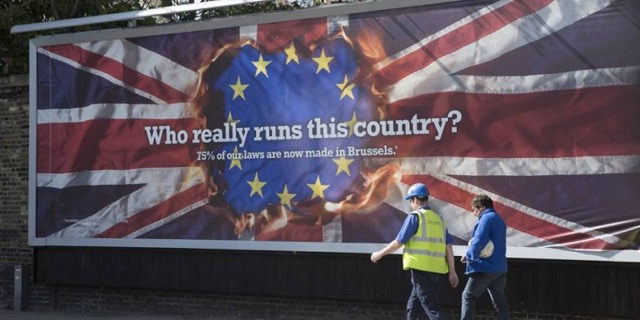Steve Kramer – Revolution Now
Pauline Kael, a renowned, late film critic for the liberal, weekly New Yorker, once said, “How could Nixon have won? Nobody I know voted for him,” referring to George McGovern’s loss to Richard Nixon in the 1972 presidential election. Many people in the United Kingdom (UK) and throughout the West are feeling somewhat the same regarding Brexit, Britain’s now-approved withdrawal from the European Union (EU). How could this happen? Everyone they know rejected it!
I, on the other hand, applaud this revolution, as do many others in Israel. Why should we favor the first signs that the EU is starting to crumble? Primarily, because the EU has become
Israel’s nemesis and now is getting its comeuppance.
As you know, Israel doesn’t have too many stalwart allies among the nations. I attribute this to the power that oil production gave to many Islamic countries, as well as others that joined their orbit; to the oldest form of racism, Anti-Semitism; and to the growing number of Muslim voters in Europe. Even Israel’s greatest ally, the US, has backed away from her, some say because of its president’s affinity for the Muslim world. (Disturbingly, the 10-year military aid package currently being negotiated between the two countries is aimed at reducing Israel’s ability to act independently.)
Capsule history: in 1950, the European Coal and Steel Community, dominated by Germany and France, was founded to unite its original six members economically and politically, in order to secure lasting peace (or, because France was afraid of Germany and Germany was afraid of itself, as my friend Howard says). In 1957, the Treaty of Rome created the European Economic Community, or Common Market, which eventually became known as the European Union. In 1974, the Euro-Arab Dialogue was formed with the Arab League, allowing an influx of Muslim laborers from North Africa into the EU, absent provisions for integration into European society. Elections for the European Parliament were held for the first time in 1979.
In 1985, the Schengen Agreement abolished internal border controls between most of the member states, while one, common “European” passport was issued in 1993. In 2002, the rollout of the Euro was completed, making it the common currency of the member states, excluding the UK (and nine other nations), which even then had reservations about its membership.
The EU, ably seconded by the UN, exerts strong pressure against Israel to “give” the Palestinian Arabs a state, ignoring Hamas-ruled Gaza and Palestinian-majority Jordan. It seems that there is almost nothing more important to the EU bureaucrats than forcing Israel to give the Jewish Homeland (Judea and Samaria, aka West Bank) to Palestinian Authority president Mahmoud Abbas (now in the 12th year of a 4-year term!) and his terrorist cronies.
As I and many others have explained repeatedly, locating a state hostile to Israel’s existence in the ancient homeland of the Jews, aka the West Bank, will never work. There are other possibilities, all of which are deemed implausible by the chattering classes, who prefer to stick to their dream of “two states living side by side in peace.” It’s a pleasant dream, but there is absolutely nothing realistic about it.
The EU has proclaimed that Israel’s new law requiring NGOs funded by the EU to publicly announce their funding sources, is “reminiscent of totalitarian regimes.” The EU’s “labeling” fixation for products produced beyond the 1949 armistice line discriminates against Israel alone, despite similar disputes around the world. Maybe, just maybe, the EU will tire of this sideshow against Israel and pay attention to its own problems: the weak economies of many member states, the millions of immigrants clamoring to enter Europe, the failure of Muslim immigrants to assimilate, the increase in Islamic terrorism, the rise in xenophobia and racism, and more.
The European Parliament is the highest legal authority of the EU states, superseding national laws and causing a huge bureaucratic expense on top of each member’s own government expenditures. Decisions taken by the (now 27) EU countries are by consensus, which pressures countries more friendly to Israel to join the majority. The EU’s population, including the UK, is 7.3% of global population and controls 24% of global GDP.
Despite, or perhaps because, of the EU’s giant influence and power, resentment grew among European citizens who felt the loss of national freedoms and customs. The UK, despite the uncertain consequences, is the first nation (probably not the last) voting to exit the EU.
As mentioned before, the chattering classes, aka the Establishment, were dismissive of the growing sentiment among the masses, whom the Establishment have disdained. Yet, belying British betting establishments’ odds, the people got its way. Britain’s decision to exit could cause the EU bureaucrats and diplomats to attend to their continent’s urgent needs, leaving little time to try to bully Israel.
I also have some hope that Britain’s startling decision will shock the UN establishment, which shares the EU proclivity to bash Israel and devote much of its time and its members’ money to browbeating Israel. With multiple problems in Europe, the Middle East, Africa and other locales, massive organizations like the UN and EU have much to do besides lecturing Israel how to manage in the Middle Eastern tinder box. Ironically, Britain may have to contend with Scotland leaving its alliance, leaving only England, Wales, and Northern Ireland.
I look forward to seeing how Europe deals with its internal eruption, feeling reassured that whatever happens, it won’t be as bad as some people think or as good as others believe it to be. In other words, we’ll all continue to muddle through the impediments that are daily thrown our way, hoping for the best possible outcome.










